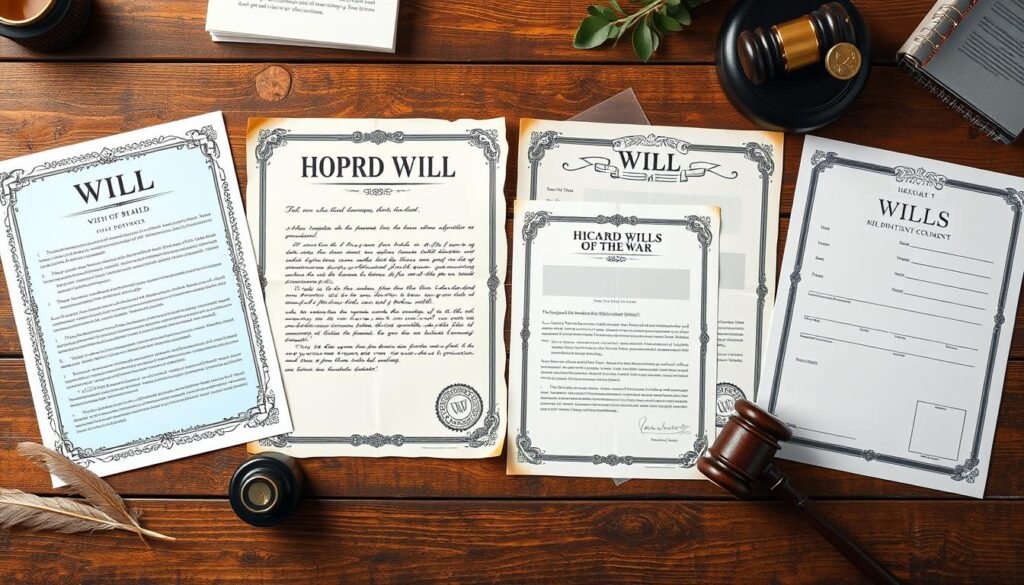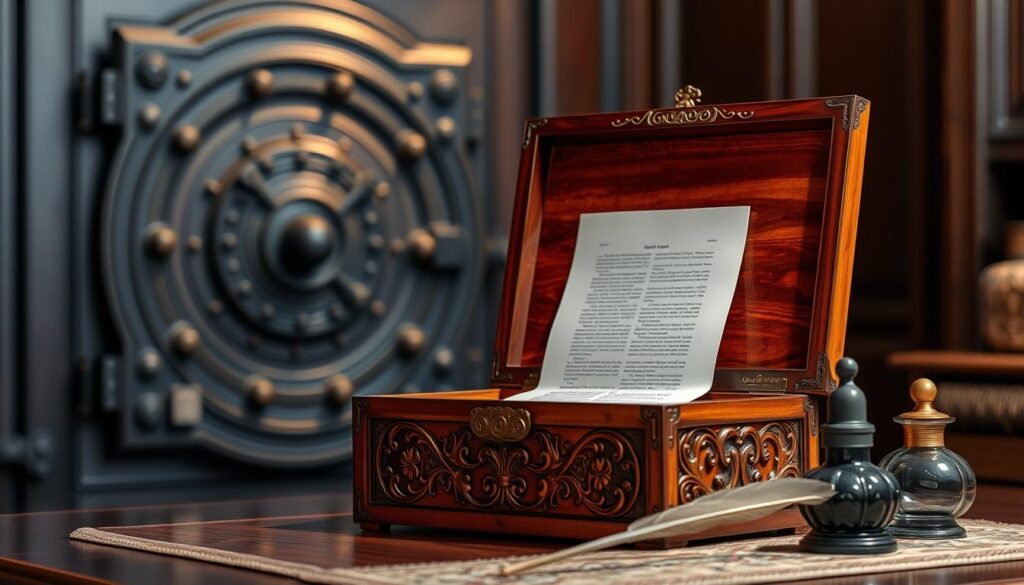how to do up a will

Creating a last will and testament is key in estate planning. It makes sure your final wishes are followed and your assets go where you want. This guide will help you make a legally binding will. We’ll cover everything from why a will is important to how to keep it safe.
Whether you’re making your first will or updating an old one, we’ve got you covered. This article will make the process easy and worry-free.
Key Takeaways
- A will is a legal document that outlines your final wishes for the distribution of your assets and the care of your minor children.
- Creating a will ensures your assets are distributed according to your preferences, rather than default state laws.
- The process of drafting a will involves determining your assets, selecting beneficiaries, and choosing an executor and guardians.
- There are various types of wills, each with specific requirements, and seeking professional assistance can help ensure your will is legally valid.
- Regularly updating your will to reflect changes in your life is crucial to ensure your final wishes are accurately reflected.
Understanding the Importance of a Will
Creating a comprehensive will is key to estate planning, yet many ignore its importance. It doesn’t matter if you’re young or old, single or married. A well-crafted will can offer great benefits and safeguard your loved ones when you’re gone.
Why Having a Will Matters
A will makes sure your assets go to the people you choose, not the state. This is crucial if you have special wishes or want to care for your children or other loved ones. It also helps avoid family fights over your estate.
Common Misconceptions About Wills
Many think wills are only for the wealthy or the elderly. But, the importance of a will is for everyone, regardless of age or wealth. Another myth is that making a will is too hard and expensive. But, with the right help, making a will is accessible to all.
Whether you’re young or old, estate planning basics like a will are vital. They ensure your wishes are followed and your family is cared for. By understanding the importance of a will, you can secure your legacy and support your family’s future.
“A well-crafted will is the cornerstone of a comprehensive estate plan, ensuring your assets and loved ones are protected.”
Determining Your Assets and Beneficiaries
Before you start writing your will, make a list of all your assets. This includes your home, investments, personal items, and any debts. Knowing what you own is the first step to making sure your wishes are followed.
After listing your assets, it’s time to name the beneficiaries in your will. Decide who gets what, like family, friends, or charities. It’s important to think carefully about this to make sure your wishes are clear and legal.
| Asset Type | Value | Beneficiary |
|---|---|---|
| Primary Residence | $500,000 | Spouse |
| Retirement Accounts | $300,000 | Children |
| Investment Portfolio | $200,000 | Charity |
| Personal Belongings | $50,000 | Siblings |
By carefully identifying your assets for a will and name the beneficiaries, you protect your loved ones. This ensures your estate planning considerations match your wishes.
Choosing an Executor and Guardians
Picking the right people to manage your estate and care for your kids is key in estate planning. By choosing an executor and guardians, you make sure your wishes are followed and your family is safe.
The Role of an Executor
An executor handles your estate after you’re gone. They have important estate planning responsibilities. These include:
- Locating and organizing your assets
- Paying debts and taxes
- Distributing your assets to your chosen beneficiaries
- Handling legal matters for your estate
When picking an executor for a will, choose someone you trust. They should handle these tasks well and fairly.
Selecting Guardians for Minor Children
If you have young children, picking a guardian is vital. This is a big part of your estate planning. Think about the guardian’s:
- Ability to give a stable, loving home
- Financial ability to support your children
- Alignment with your parenting values
Naming guardians in your will means your children will be cared for as you wish.
“Preparing for the unexpected is one of the greatest gifts you can give your loved ones.”
Types of Wills and Their Requirements
There are many types of wills, each with its own rules. Knowing about these can help you pick the right one for you. This way, your wishes are clear and followed after you pass away.
The simple will is a common choice. It tells who gets your stuff when you’re gone. Simple wills are easy to make and are liked by many people.
The living will deals with health care, not who gets your stuff. It lets you say what you want for your care at the end of life.
- Holographic wills are handwritten and don’t need witnesses. But, they might not be recognized everywhere.
- Pour-over wills work with a living trust. They make sure any left-over assets go to the trust after you die.
No matter the type, your will must follow your state’s laws. This makes sure it’s valid and followed. An estate planning lawyer can guide you to the best will for your situation.
“Having a well-crafted will in place provides invaluable peace of mind and helps ensure your final wishes are honored.”

Steps to Drafting a Valid Will
Drafting a will is key to making sure your final wishes are followed. It’s important whether you’re making a will for the first time or updating an old one. Let’s look at the main steps to create a valid will that covers the how to draft a will, necessary components of a will, and will writing process.
Essential Elements of a Will
A good will should have certain key parts:
- Identification of the testator (the person making the will)
- Appointment of an executor to manage the distribution of assets
- Clear instructions for the distribution of personal property, real estate, and financial assets
- Specific bequests or conditions, such as charitable donations or instructions for caring for pets
- Guardianship arrangements for minor children
By including these elements, your will will be legally valid and clearly state your wishes.
The will writing process might seem hard, but by following these steps and getting help from lawyers if needed, you can make a detailed and legally binding document. This will give you and your loved ones peace of mind.
How to Do Up a Will
Creating a will is a key part of planning your estate. This guide will help you make a will that reflects your wishes. You’ll learn how to gather information, write the will, and finalize it.
Here are the main steps to create a will:
- Identify your assets and liabilities. List your property, investments, bank accounts, and other valuable items.
- Determine your beneficiaries. Choose who will get your assets, like family, friends, or charities.
- Choose an executor. Pick someone trustworthy to manage your estate according to your wishes.
- Appoint guardians for minor children. If you have young dependents, choose guardians for them.
- Review and revise your will. Update your will as needed to reflect your current wishes.
- Finalize and execute your will. Sign the will in front of witnesses to make it official.
By following these steps, you can make a detailed will writing checklist. This ensures your estate planning process is smooth and reflects your wishes. Remember, the steps to create a will can change based on where you live and your situation. Always talk to a lawyer to make sure your will is valid.
“A well-executed will is the cornerstone of a robust estate plan, ensuring your legacy is preserved and your loved ones are cared for.”
| Key Steps to Create a Will | Description |
|---|---|
| Identify Assets and Liabilities | Make a comprehensive list of your property, investments, and other valuable possessions. |
| Determine Beneficiaries | Decide who you want to inherit your assets, such as family members, friends, or charities. |
| Choose an Executor | Select a trusted individual or institution to oversee the distribution of your estate. |
| Appoint Guardians | Designate suitable guardians to care for your minor children in the event of your passing. |
| Review and Revise | Regularly review and update your will to ensure it reflects your current circumstances and desires. |
| Finalize and Execute | Sign the completed will in the presence of witnesses to make it legally binding. |
Updating and Revising Your Will
Life is always changing, and so should your will. It’s important to review and update your will regularly. This ensures it stays current and reflects your current wishes. Making changes to your will is a key part of estate planning.
Life Events That Necessitate Will Updates
There are many life events that might make you need to change your will. Here are some common ones:
- Marriage or divorce
- The birth or adoption of children
- Getting new assets, like property or investments
- Changes in your financial situation, like more or less money
- Death of someone named in your will
- Moving to a new state or country, which might change your will’s legal status
By keeping your will up to date, you make sure your wishes are known. And you protect your loved ones.
| Life Event | Potential Will Update |
|---|---|
| Marriage | Add spouse as a beneficiary |
| Divorce | Remove ex-spouse as a beneficiary |
| Birth of a child | Add children as beneficiaries, name guardians |
| Acquisition of new assets | Update asset distribution among beneficiaries |
| Death of a beneficiary | Redistribute assets among remaining beneficiaries |
Stay alert and update your will as your life changes. This way, your estate plan stays current and protects your loved ones. Regular updates are crucial for a complete estate plan.
Storing and Safeguarding Your Will
Keeping your will safe is key in estate planning. After you’ve made your will, you need to protect it. Here are tips on where to keep a will and securing a will for estate planning safety.
Choosing a Safe Storage Location
First, pick a safe place to store your will. Good choices include:
- A fireproof and waterproof safe or safe deposit box at your bank
- A lockbox or cabinet in your home, preferably one that is bolted to the floor or wall
- With your attorney or a trusted friend or family member (though you’ll want to ensure they understand the importance of keeping it safe)
Don’t store your will where it could get lost, damaged, or stolen. Avoid desk drawers or filing cabinets.
Granting Access to Your Will
You also need to make sure the right people can find your will. This includes your executor and any beneficiaries. Give them copies or tell them where it is.

By following these tips for where to keep a will and securing a will, you’ll keep your estate planning safe. This way, your documents will be ready when needed.
Avoiding Common Mistakes in Will Preparation
Making a legally binding will is key in estate planning. Yet, many people make mistakes that can ruin their wishes. Knowing the will preparation errors and estate planning pitfalls helps avoid costly common will mistakes. This way, your final testament truly shows your intentions.
Pitfalls to Watch Out For
One big mistake is forgetting to update beneficiaries as life changes. Not changing your will after big events like a divorce or a new baby can lead to wrong asset distribution.
Another mistake is not doing the will right. If it’s not witnessed, signed, or notarized correctly, it might not be legal. This could cause fights among your heirs and cost a lot of money.
- Not including important details, like who should take care of your kids or your funeral plans, can cause confusion and bad outcomes.
- Not listing all your assets or not titling them right can mean your estate won’t go where you want it to.
By knowing these common will mistakes and avoiding them, you can make sure your will is valid and reflects your wishes.
“The best way to avoid will preparation errors is to be proactive and diligent in the estate planning process.”
Hiring a Professional or DIY: Weighing the Options
Creating a will can be done in two ways: by hiring an estate planning attorney or by doing it yourself. Each method has its advantages and disadvantages. Your decision should be based on your personal needs, budget, and comfort with legal matters.
Hiring an Estate Planning Attorney
An estate planning attorney can help make sure your will is done right. This is especially helpful if your estate is complex or you have special needs. But, this service can cost more than making a will yourself.
DIY Will Creation
DIY will creation is cheaper for those with simple estates. Online tools and templates can guide you through making a basic will. It’s good for saving money, but there’s a risk of legal problems if the will isn’t done correctly.
Weighing the Pros and Cons
When choosing between an estate planning attorney and making a will yourself, think about these points:
- Cost: An attorney might cost more, but they can give you peace of mind and make sure your wishes are clear.
- Complexity: If your estate is complicated or you have special needs, an attorney can handle the legal details better.
- Personalization: An attorney can make your will fit your specific needs, while DIY options might be more limited.
- Legal expertise: Attorneys know the law well, making sure your will is valid and can be followed, whereas DIY might have mistakes.
The choice between hiring an estate planning attorney or making a will yourself depends on your situation. Think about the pros and cons to decide what’s best for you and your family.
Conclusion
Drafting a will is key to making sure your wishes are followed and your loved ones are taken care of. You’ve learned about the importance of a will and how to choose the right people to handle your estate. This is the first step in creating a solid estate plan.
Creating a will involves knowing the different types and their needs. You’ve also learned the steps to make a valid will. Remember to update your will as your life changes. This way, you’ll be ready to move forward with your estate planning.
The will drafting process is just the start. Keep getting advice from experts and stay up-to-date with estate planning laws. This ensures your wishes are carried out. By doing this, you’ll have peace of mind knowing your loved ones are taken care of and your estate goes as you wish.

Leave a Reply